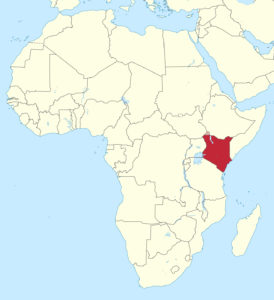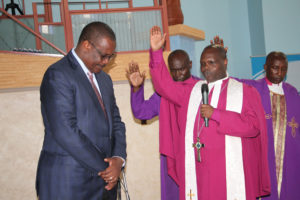
by Fredrick Nzwili, RNS | Sep 23, 2021 | Headline News |

Kenya, in red, located in eastern Africa. Map courtesy of Creative Commons
NAIROBI, Kenya (RNS) — Some churches in Kenya have barred politicians from addressing their congregations, saying campaigning during services disrespects the sanctity of worship.
The national Anglican, Presbyterian and Roman Catholic churches have all issued bans, as many of the politicians begin early stumping for next year’s general elections. The Methodist Church, however, is keeping the church doors open for all.
The Rev. Joseph Ntombura, presiding bishop of the Methodist Church in Kenya, has said his church is not dissenting from the effort but is taking a different approach. The bishop said shutting the doors to politicians would mean discriminating against some of its members.
“The church is for all people,” Ntombura told Religion News Service in a telephone interview. “Human beings are political, so there is nothing wrong with inviting the politicians in church.”
According to the bishop, congregations need to hear the views of politicians on issues of national interest, such as the sharing of resources. In the past, Ntombura said, the church has invited other experts to speak to congregations on important matters, and politicians are no different.
“Some of the politicians are our pastors,” said Ntombura.

The Rev. Joseph Ntombura, with microphone, presiding Bishop of the Methodist Church in Kenya, prays over former Nairobi Governor Evans Kidero, left, in Nov. 2015. RNS photo by Fredrick Nzwili
Kenya is about 85% Christian. About 33% of that group are Protestants and 20.6% are Catholic. The rest belong to evangelical, Pentecostal and African denominations. Muslims make up 11% of the population.
In issuing the bans on politicking in church, denominations have said they feared that church services would become campaign rallies and that candidates would use language bordering on hate speech in an attempt to win votes or sway the views of congregations. In the past, politicians hijacked church services to sell their agendas or criticize their opponents. Some have appeared in the churches with huge sums of money as offerings or as funds for church projects.
The no-politicking effort gained momentum this month when Archbishop Jackson Ole Sapit, the Anglican primate of Kenya, announced his church’s ban.
“Everyone is welcome in the churches, but we have the pews and the pulpit,” said Ole Sapit on Sept. 12, during the ordination of Kenya’s first Anglican woman bishop. “The pulpit is for the clergy and the pews for everyone who comes to worship.”
On Sept. 15, the Roman Catholic bishops said their places of worship and liturgy were sacred and were not political arenas. They urged politicians to attend Mass just like any other worshippers.
Analysts say the churches are seeking to reclaim their position as “honest arbitrators” in a country where elections often generate violent conflicts.
The most deadly came in December 2007 and January 2008, when two months of ethnic fighting left at least 1,000 people dead and more than 600,000 displaced from their homes. Among them, 30 people, mainly ethnic Kikuyu, Kenya’s largest tribe, were burnt alive in an Assemblies of God church in Kiambaa Village in Eldoret.
Henry Njagi, program and information manager at the National Council of Churches of Kenya, said resistance to church guidelines on political speech risks a repeat of the events of 2008.
“When things went wrong, they turned around and accused the church of being silent and abandoning Kenyans,” said Njagi. “So right now is a call on political actors, aspirants and other stakeholders to listen to the church … and stop toxic politicking.”
Though the politicians have not been as present at mosques, Muslim leaders say they are supporting the ban on toxic politicking in the churches.
“I support the Christian leaders. Such a ban is long overdue,” said Sheikh Hassan Ole Naado, national chairman of the Supreme Council of Kenya Muslims.
He added that Muslims were not facing the issue at the moment.
“When you go to a place of worship, you know what you are supposed to do. They are taking advantage of people who are gathered for worship. It should not happen in the first place,” said Ole Naado.
by Rachel Darling | Sep 26, 2011 | Feature, Headline News |
 It’s no secret that the American public is less than pleased with the performance of its national political leaders. As Republicans and Democrats once again threaten to shut down the federal government over budget disagreements, more Americans are becoming fed up. Anecdotes of anger and distrust have been repeated at length from the mouths of journalists across the country. A recent CNN poll joins a string of others that reflect America’s growing uneasiness with the White House and Congress. The findings of these polls are no surprise to those struggling to make financial ends meet, pay for college, or find a decent job.
It’s no secret that the American public is less than pleased with the performance of its national political leaders. As Republicans and Democrats once again threaten to shut down the federal government over budget disagreements, more Americans are becoming fed up. Anecdotes of anger and distrust have been repeated at length from the mouths of journalists across the country. A recent CNN poll joins a string of others that reflect America’s growing uneasiness with the White House and Congress. The findings of these polls are no surprise to those struggling to make financial ends meet, pay for college, or find a decent job.
Only 15 percent of Americans approve of how Congress is managing the economy. Only about 40 percent approve of the job President Obama is doing in leading our country. It’s safe to say Washington politicians don’t possess a good reputation these days.

 Common sense, which seems to be increasingly less common, will tell you that reputation is important. Even the reputation of non-breathing entities, like companies, can be broken by a loss of confidence or a reputation for dishonesty (Enron, anyone?). Common sense would also suggest that Congress and the president should begin listening very closely to the desires of those who voted for them.
Common sense, which seems to be increasingly less common, will tell you that reputation is important. Even the reputation of non-breathing entities, like companies, can be broken by a loss of confidence or a reputation for dishonesty (Enron, anyone?). Common sense would also suggest that Congress and the president should begin listening very closely to the desires of those who voted for them.
If the 2008 Obama campaign helped inspire a new movement of young and engaged voters, and the Obama presidency helped stoke the emergence of the fiery Tea Party, then the current economic crisis seems to be fostering a new scrutiny from voters who are demanding less partisan dogmatism and more practical results from Washington. This is the reason why, for instance, President Obama cranked out his ambitious proposal for a new jobs bill and immediately hopped on a bus to tout its benefits to voters across Middle America.
While the Middle East is continuing to wrestle with the negative and positive repercussions of the “Arab Spring,” America is undergoing its own kind of political uprising. The fallout of the debt-ceiling debate, high unemployment, and the global economic breakdown is causing a sharp awareness of just how important politics is to our everyday life. On the swift wings of social media like Twitter, Facebook, and YouTube, more Americans are reaching out and connecting with others who share their struggles and their convictions.
Many Americans are beginning to take a long, hard look at what their political parties stand for and are for the first time truly recognizing what lies behind the banners of donkeys and elephants. They are beginning to debate and school themselves on federal programs and legislation that were formerly relegated to Political Science 101 term papers.
Social Security, unemployment benefits, health care, class structure, welfare, immigration reform, tax cuts, abortion, and gay marriage are but a few issues that are forcing Americans, in the wake of Congress’ total disassociation with the public consciousness, to reevaluate what it means to exercise their political voice.
This renewed “awakening” has consequences for those in Washington and those unhappy with it. For some it means kissing reelection goodbye, for others it means confronting personal biases against their fellow Americans to forge common bonds and promote positive changes in their communities.
It means recognizing the true political beliefs of our neighbors and ourselves — beyond the Red State/Blue State trope. It means daring to talk about the deep divides in worldview that may exist inside and outside of party lines. It means rejecting some popular philosophies and embracing others.
It means taking time to read, watch, and listen.
It means talking, debating, and at times arguing.
For Christians it means being more focused and intentional in our prayers.
It also means a yearning for real answers to our problems.
The growing frustration in America, fueled by Washington’s legislative intransigence, is driving a political awakening that is something new for many Americans. It is a painfully personal coming-to-terms with where one stands as an American, regardless of party affiliation. It is a willingness to make tough decisions about the future, and to make short-term sacrifices for the nation’s long-term wellbeing.
It is an awakening driven by the harsh, inescapable realities of our new economic environment.
Our political leaders would do well to turn their eyes and ears toward an American populace more poignantly aware than ever of its political interests and influence.
The members of Congress may be demonstrating that they have lost their will to seek practical solutions, but those that elected them certainly have not.




 It’s no secret that the American public is less than pleased with the performance of its national political leaders. As Republicans and Democrats once again
It’s no secret that the American public is less than pleased with the performance of its national political leaders. As Republicans and Democrats once again 
 Common sense, which seems to be increasingly less common, will tell you that reputation is important. Even the reputation of non-breathing entities, like companies, can be broken by a loss of confidence or a reputation for dishonesty (Enron, anyone?). Common sense would also suggest that Congress and the president should begin listening very closely to the desires of those who voted for them.
Common sense, which seems to be increasingly less common, will tell you that reputation is important. Even the reputation of non-breathing entities, like companies, can be broken by a loss of confidence or a reputation for dishonesty (Enron, anyone?). Common sense would also suggest that Congress and the president should begin listening very closely to the desires of those who voted for them.